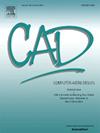基于强化学习的六面体网格实体模型自动分块分解
IF 3.1
3区 计算机科学
Q2 COMPUTER SCIENCE, SOFTWARE ENGINEERING
引用次数: 0
摘要
为CAD模型生成高质量网格是数值模拟的关键预处理任务。尽管网格生成技术已经很成熟,但自动六面体网格划分仍然具有挑战性,特别是对于复杂的几何形状。传统的方法通常需要人工干预将实体模型分解为更简单的可网格块,这是劳动密集型的,并且需要专业知识。为了解决六面体网格实体模型的自动化分块分解的挑战,我们提出了一种新的强化学习(RL)框架。该框架使智能体能够通过与CAD建模环境交互来学习最佳分解策略。主要贡献包括一种网络友好的方法,用于表示和学习环境状态和智能体的动作——3d几何形状和相应的块分解操作;将模仿学习与强化学习相结合的两步训练策略,提高训练效率。实验结果表明,基于rl的方法可以更有效地实现复杂三维实体模型的自动分块分解,生成高质量的六面体网格。本文章由计算机程序翻译,如有差异,请以英文原文为准。
Reinforcement learning based automatic block decomposition of solid models for hexahedral meshing
Generating high-quality meshes for CAD models is a crucial preprocessing task for numerical simulation. Although mesh generation techniques are well-established, automatic hexahedral meshing remains challenging, particularly for complex geometries. Conventional methods often require manual intervention to decompose solid models into simpler, meshable blocks, which is labor-intensive and demands expert knowledge. To address the challenge of automating the block decomposition of solid models for hexahedral meshing, we propose a novel reinforcement learning (RL) framework. This framework enables an agent to learn optimal decomposition strategies by interacting with a CAD modeling environment. Key contributions include a network-friendly method for representing and learning the environment’s state and the agent’s actions—3D geometric shapes and the corresponding block decomposition operations; a two-step training strategy that integrates imitation learning with reinforcement learning to improve training efficiency. Experimental results demonstrate that our RL-based method achieves a more effective automatic block decomposition of complex 3D solid models for generating high-quality hexahedral meshes.
求助全文
通过发布文献求助,成功后即可免费获取论文全文。
去求助
来源期刊

Computer-Aided Design
工程技术-计算机:软件工程
CiteScore
5.50
自引率
4.70%
发文量
117
审稿时长
4.2 months
期刊介绍:
Computer-Aided Design is a leading international journal that provides academia and industry with key papers on research and developments in the application of computers to design.
Computer-Aided Design invites papers reporting new research, as well as novel or particularly significant applications, within a wide range of topics, spanning all stages of design process from concept creation to manufacture and beyond.
 求助内容:
求助内容: 应助结果提醒方式:
应助结果提醒方式:


